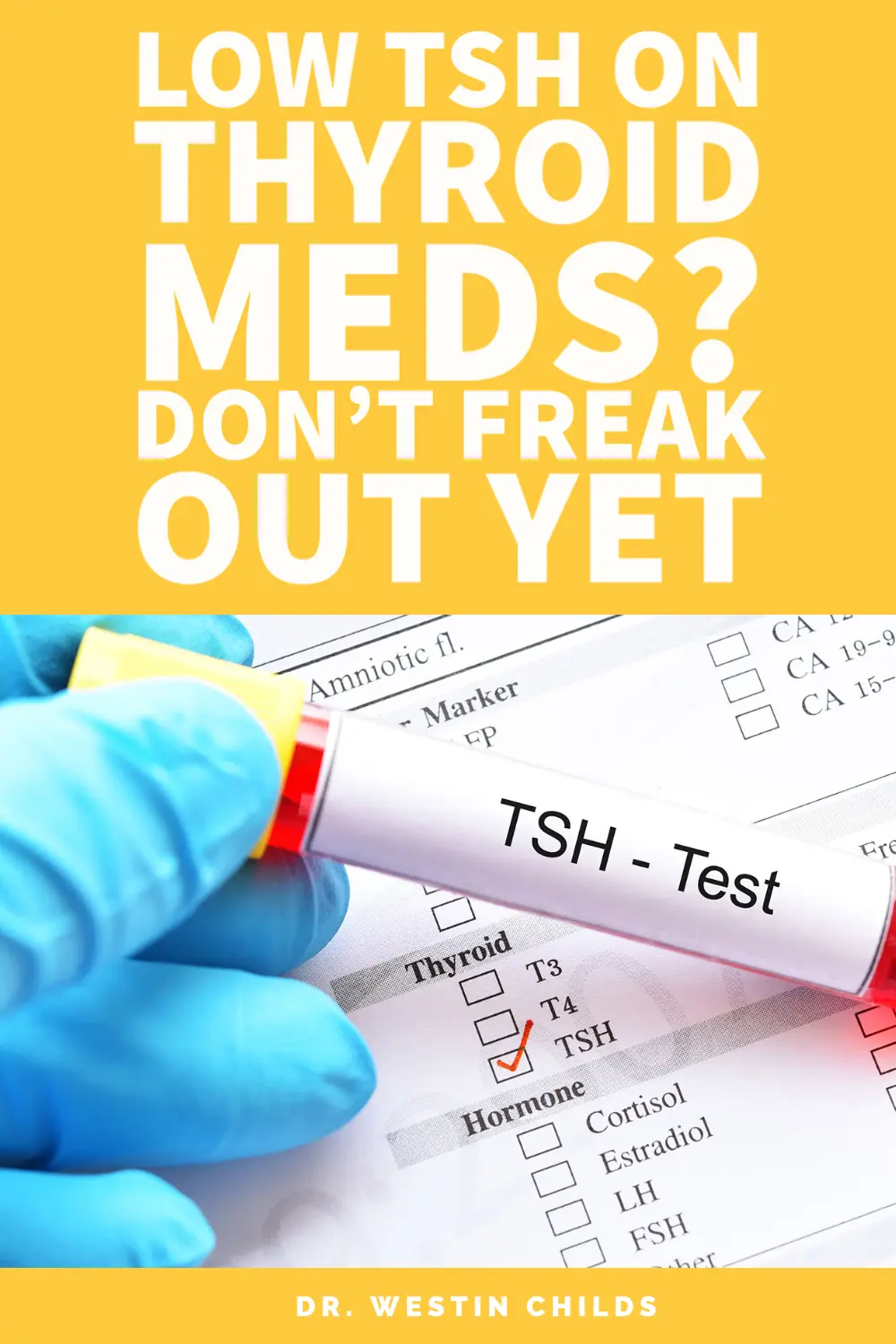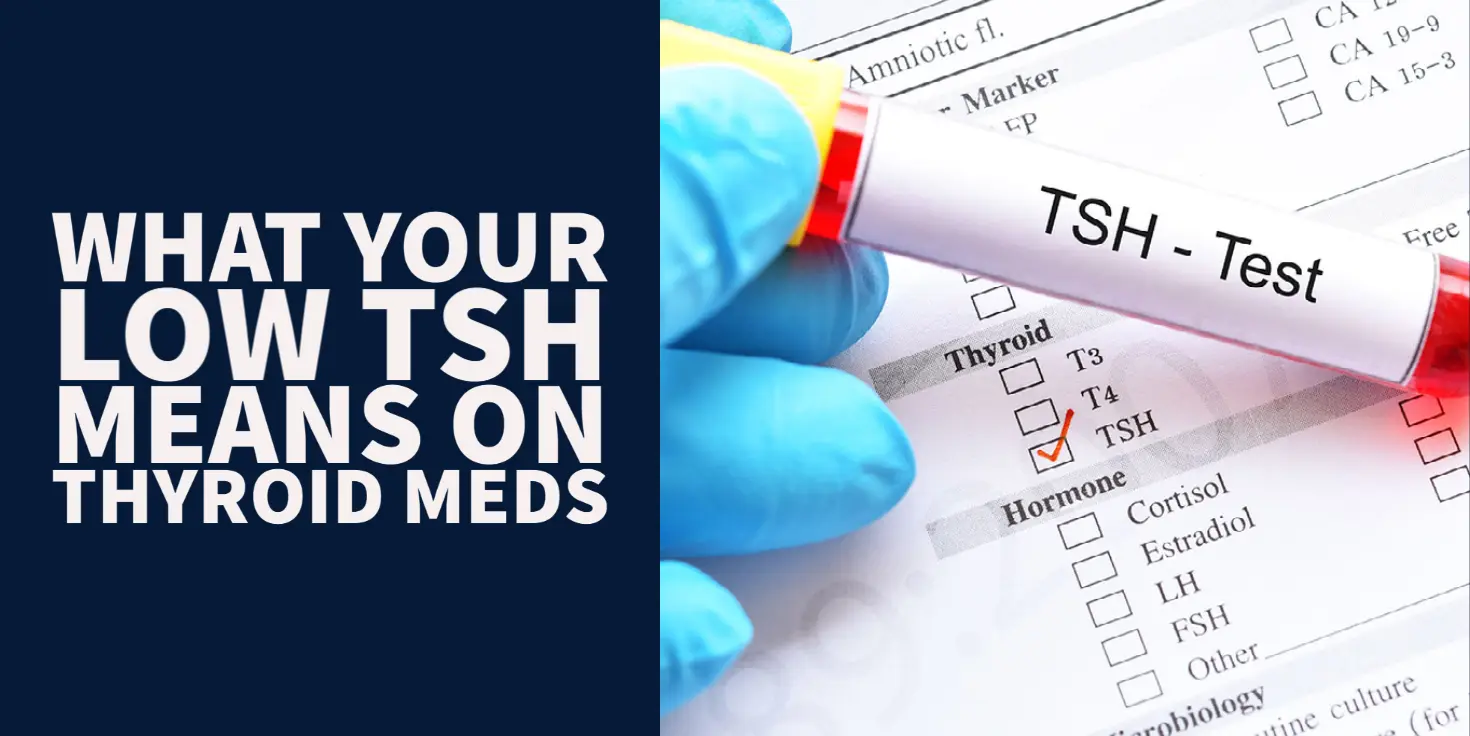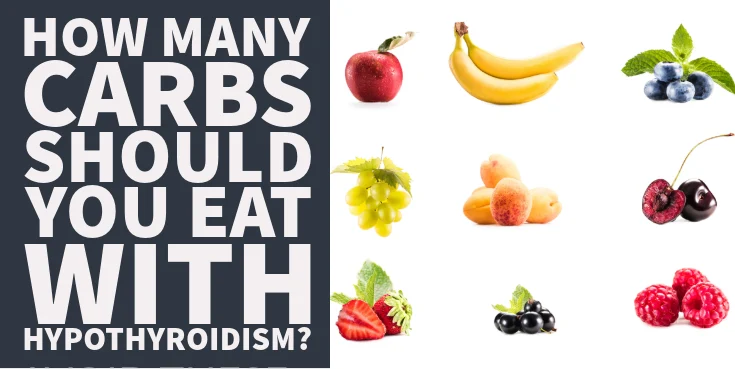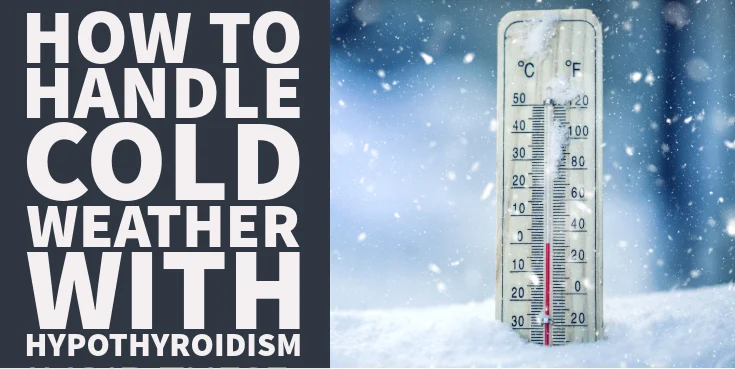Would it surprise you to know that you can have a low TSH but still be hypothyroid?
This situation is not uncommon and may be occurring in your body right now.
On the flip side, a low TSH can also be an indicator of hyperthyroidism.
Your TSH can be a helpful tool in evaluating thyroid function in the body but it certainly isn’t the only tool (and it isn’t even the best).
This article will help you understand how to evaluate your TSH, what causes a low TSH, and what it means if you have a low TSH while taking thyroid medication:
What Does your TSH Actually Mean?
First things first.
We need to talk about what your TSH actually is and what causes it to change.
Once we discuss these things it will be easier to understand the more complex aspects of this hormone.
But first, let’s start with some basics:
TSH, which stands for thyroid stimulating hormone, is a hormone secreted by your pituitary gland and is a part of your endocrine system.

As the image above shows, TSH is only a part of the entire thyroid regulatory system.
It’s supposed to target your thyroid gland directly which results in the production of thyroid hormone (both T3 and T4) from the gland.
Basically, it does exactly as its name suggests: stimulates thyroid hormone from the thyroid gland.
So, why is this important?
If your TSH is low then it will not be stimulating your thyroid gland and you will have low levels of circulating thyroid hormone.
3 Main Causes of Low TSH
Now that you understand what the TSH does in the body we can discuss conditions that may cause your TSH to be lower than normal.
When evaluating your TSH there are 3 primary conditions that can alter your TSH and lead to a low TSH:
#1. Too much thyroid production (Endogenous Hyperthyroidism)
The most common cause of low TSH is the condition known as hyperthyroidism.
Hyperthyroidism is a medical condition that causes abnormal production of thyroid hormone that exists outside of the normal feedback loops meant to protect this from happening.
The most common cause of this condition is the autoimmune Graves’ disease which is probably the main reason that you may experience a low TSH (1).
If your body produces too much thyroid hormone then that thyroid hormone will feedback to your brain and it will naturally respond by reducing the TSH to try and protect against too much thyroid hormone.
Identifying a low TSH caused by hyperthyroidism is quite easy because the TSH will be low and the free T3 will often be high (2).
In addition, you might also see the presence of thyroid-stimulating immunoglobulin in the bloodstream.
We won’t focus too much on this today because the diagnosis and management of hyperthyroidism are relatively easy compared to the other conditions we will discuss.
#2. Too much thyroid medication (Exogenous Hyperthyroidism)
Another increasingly common condition that may lead to a low TSH is the use of prescription thyroid medications.
If you take thyroid medication by mouth, it will be absorbed by the gastrointestinal tract and hit your bloodstream.
From there it will circulate to your brain where it will tell your body to produce less TSH.
As you take thyroid medication you are effectively shutting off the normal feedback loop which exists to produce thyroid hormone because your body doesn’t need to produce it anymore.
This is both a good and a bad thing.
Good if your thyroid can’t produce thyroid hormone, and bad because it can make interpreting your thyroid lab tests more confusing as you shut off the normal production of thyroid hormone.
Even as you take thyroid medication your body will still be able to produce some natural thyroid hormone, but this amount will slowly decrease as you increase the amount of thyroid medication that you are taking.
The idea that taking thyroid medication drops the TSH is incredibly important because it’s how many Doctors determine if your dose is ‘sufficient’.
The problem with this approach is that newer studies have shown that TSH doesn’t always do a good job at predicting if you have enough thyroid hormone (3) in your body and that is one of the major reasons I am writing about this topic.
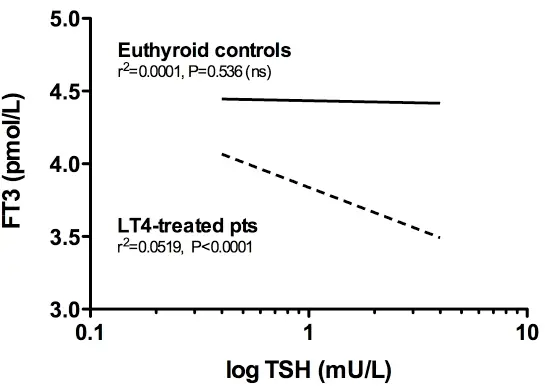
People who have a low TSH from taking thyroid medication may have low, normal, or high free T3/free T4 which differentiates this condition from low TSH (4) caused by overproduction of the body.
Also, those with this condition may have variable symptoms ranging from those of hyperthyroidism to those of hypothyroidism.
#3. Not Enough Production of TSH From the Pituitary Gland
Another reason you may have a low TSH is due to issues directly related to the pituitary gland itself (5).
If your pituitary gland is unable to produce TSH then obviously your levels will fall because your body can’t get it anywhere else.
This condition will always result in both a decrease in TSH and a decrease in circulating thyroid hormones and it’s best to think of this condition on the hypothyroid spectrum.
Emerging information is also showing us that the pituitary gland and hypothalamus are increasingly sensitive to environmental triggers such as the foods that you eat and your weight.
Both of these conditions can alter the amount of TSH and TRH that your brain is capable of producing which will then impact your free thyroid hormones.
Consider this example:
If you are someone who is under a significant amount of stress and you are a frequent dieter (both conditions known to lower the TSH and TRH) your TSH may be falsely low which will reduce
If you didn’t understand that a low TSH could be caused by stress and diet you might be inclined to believe that your thyroid is perfectly normal, even though it isn’t.
For this reason, and many others, it’s important to have a complete understanding of conditions that impact the TSH and how they present.
You can learn more about the way that each of these conditions impacts TSH and cause different symptoms here.
DOWNLOAD FREE RESOURCES
Foods to Avoid if you Have Thyroid Problems:
I’ve found that these 10 foods cause the most problems for thyroid patients. Learn which foods you should avoid if you have thyroid disease of any type.
The Complete List of Thyroid Lab tests:
The list includes optimal ranges, normal ranges, and the complete list of tests you need to diagnose and manage thyroid disease correctly!
Using TSH to Diagnose Thyroid Problems
It may surprise you to know that there are no fewer than 5 different blood tests that you can run on your thyroid.
Despite this, doctors tend to order only one of those tests.
In fact, the current paradigm of thyroid treatment places a considerable amount of weight on this single test (6).
In other words:
Doctors use this test as a surrogate marker to evaluate thyroid function in your entire body.
We will talk about why that isn’t necessarily a good thing in a moment, but we need to stay on track.
So how does your TSH level alter your thyroid hormone?
This part can be a little confusing but I’m going to try and explain it in a way that makes sense.
Assuming that you are not taking thyroid medication (this assumption is very important) a high TSH usually indicates that you are not producing enough thyroid hormone.
I know what you’re thinking…
How can a high TSH mean that I have low thyroid hormone if TSH is supposed to make my thyroid gland produce more thyroid?
In order to understand this question, you have to understand the concept of feedback loops in the body.
A feedback loop is designed to manage the concentrations of hormones in your body by telling your body to reduce or increase certain hormones based on specific signals.
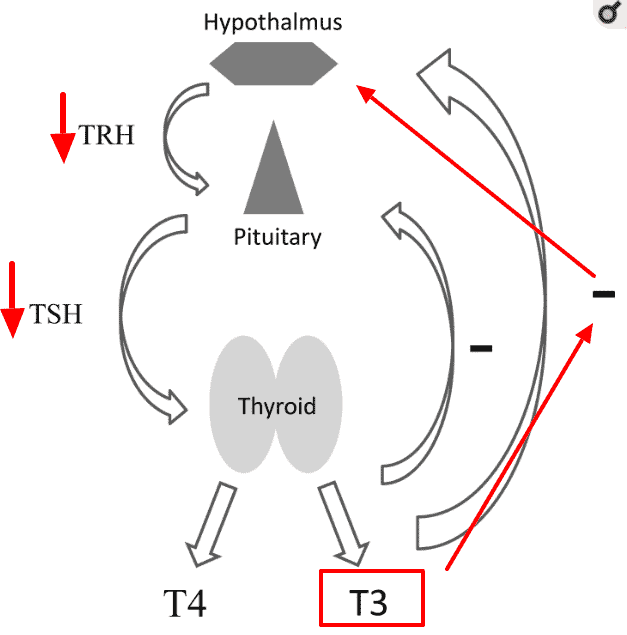
In this case, thyroid hormones which are released from the thyroid circle back to your brain and tell your body that you have ‘enough’.
Your body then reacts by adjusting the TSH.
If your TSH is high, it means that there is a low amount of thyroid hormone in the bloodstream which is coming into contact with your brain.
If the concentration of thyroid hormone is low in the serum then your body will react by increasing TSH to try and force the thyroid to produce more thyroid hormone.
The opposite is true when you have too much thyroid hormone in your body.
As thyroid hormone increases (either because you are taking thyroid medication or because your body is producing it), your brain will react by lowering the TSH to try and reduce the stimulation of the thyroid gland.
This is how a low TSH is often associated with hyperthyroidism and how a high TSH is often associated with hypothyroidism.
Instances Where the TSH can be Misleading
And, if this wasn’t confusing enough, it gets even more interesting.
Just because your TSH is low doesn’t mean that your body is getting enough thyroid hormone.
We often associate a low TSH with a state of hyperthyroidism, meaning too much thyroid hormone, but that isn’t always the case.
I want to spend a large portion of this article discussing states where there is discordance between the TSH and the thyroid status in your body.
Discordance refers to a mismatch between what we expect to happen and what actually happens.
So, when you have a low TSH, especially if you are taking thyroid medication, we expect that to mean that you have too much thyroid hormone in the body.
But this isn’t always true.
There are several states which can cause your TSH to be lowered but where there is an insufficient amount of thyroid hormone in your cells.
This has been shown in several studies (7) which highlight the difference between healthy individuals and their TSH and what happens to patients who take thyroid medication to normalize their TSH.
Those who take thyroid medication have significantly lower free thyroid hormone levels than controls.
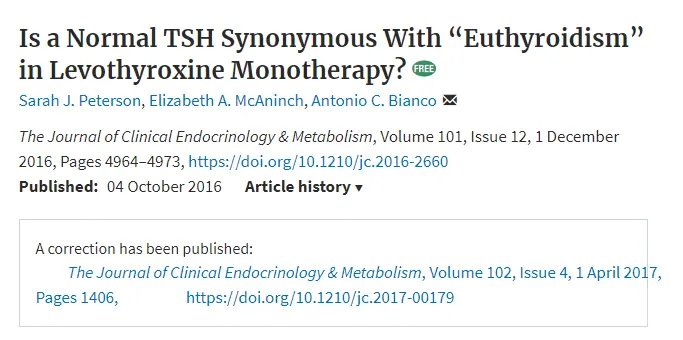
With that in mind, let’s focus on understanding what happens to your TSH when you are taking thyroid hormone and why it doesn’t always mean that you are ‘healthy’.
What Happens to your TSH When Taking Thyroid Hormone?
It turns out that TSH is a really good predictor of what is happening in the pituitary gland itself, but it doesn’t necessarily tell you how much thyroid hormone is getting into your other tissues.
And this is important because almost every cell in your body has a thyroid receptor.
So TSH would be a great predictor of thyroid function in the body IF your pituitary gland was just like every other tissue in the body, but it isn’t.
Your pituitary gland has special deiodinases which are different than other tissues in the body making it more sensitive to thyroid hormone than other tissues.
What does this mean?
It means that as you give someone thyroid hormone (especially T4) their pituitary gland will sense the thyroid hormone and drop the TSH in accordance.
But your other tissues may not get that thyroid hormone.

This results in patients who have normal or low TSH but still have symptoms of hypothyroidism.
Do all thyroid hormones alter the TSH equally?
No.
And in order to understand this, we need to talk about basic thyroid physiology first.
The two most important thyroid hormones in circulation include T4 and T3.
T4 is the inactive thyroid hormone in your body, but it has the potential to be activated by deiodinases after cleaving off an iodine moiety turning it into T3.
T3 is the ACTIVE thyroid hormone in your body. It turns on genetic transcription resulting in changes to your genes and the production of enzymes in your cells.
Why is this important?
Because most thyroid hormone that is used as a replacement is in the T4 form.
Meaning the thyroid hormone that doctors give you MUST be activated before your body can actually use it.
But here’s where things get interesting:
Your pituitary gland has no problem activating T4 into T3, in fact, it does this quite well.
But other tissues in your body have to compete with an inactive thyroid metabolite known as reverse T3.
Reverse T3 is the ugly stepsister of T3 and directly competes with T3 for binding and turning on genes.
Oh, and reverse T3 is created from T4 just like T3 can be.
So this means, in most tissues in your body, there is a tug-of-war going on between T3 binding and reverse T3 binding.
But this tug-of-war is not happening in your pituitary gland.
This is why basing your dosing decisions on the TSH by itself is not necessarily a wise decision.
So, how does taking thyroid hormone alter your TSH?
Taking either T4 or T3 will reduce your TSH, no question about it.
It turns out that T3 is about 3-4 times more powerful at reducing your TSH than T4 (8) is but they will both reduce it.
So if your TSH isn’t the best way to evaluate thyroid function…. what is?
Using Free T3, Free T4, and Reverse T3 for the Whole Picture
If you want to get a picture of what is actually happening in your thyroid gland then you really need to order more than just the basic TSH.
Ordering and evaluating your free thyroid hormones (like free T3, free T4, and reverse T3) can help give you an idea of what kind of competition exists for binding in your cells.
For instance:
We know that T3 is the “good” thyroid hormone so we can conclude (under normal circumstances) we probably want more free T3 in our body than reverse T3.
Why?
Because if they are both competing for binding in our cells, we probably want the good guy to win.
So it makes sense that if we test your thyroid hormone and you have low free T3 with high reverse T3 that probably isn’t a good thing.
And this condition happens to have a name: thyroid resistance.
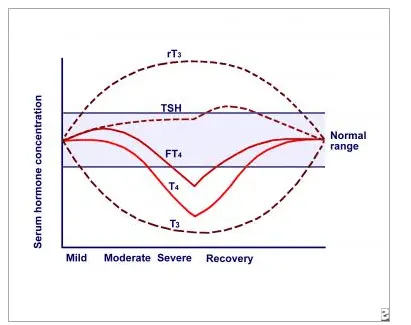
But, what is the TSH doing in situations like this?
Your TSH may be normal in this type of condition making diagnosis difficult.
Because really what is happening is that you have tissue-level hypothyroidism with “normal” blood levels of thyroid hormone.
Now your next question should be: is this common?
And the answer is that yes, it is more common than you think.
Conditions and behaviors such as repeated exposure to stress, yo-yo dieting, fasting, taking certain medications, and exposure to endocrine disruptors can all impact how well your body converts T4 to T3.
The presence of the conditions listed above promotes the conversion of T4 to reverse T3.
You can easily identify the relative levels of each of these thyroid metabolites with the following tests:
- Free T3
- Free T4
- Reverse T3
- Total T3
- Bottom line: You need more than just your TSH to determine what is actually happening in your body. Make sure that you get a complete thyroid panel when evaluating your thyroid function.
What is a Normal TSH?
Even though we know that the TSH isn’t necessarily the best test to use to diagnose or manage hypothyroidism it still has some value.
So what is the ideal TSH level?
Well, that depends on whether you are on thyroid medication or not.
Ideal TSH levels based on your condition:
- Not taking any thyroid medication – Generally healthy populations (not on thyroid hormone) have a TSH between 1.0 and 2.0 (9).
- On Thyroid medication – Your TSH may fluctuate dramatically based on whether you are taking T3 or T4, but in most cases, you will want a TSH that is less than 1.0. This lower TSH is required to obtain close to normal free thyroid hormone levels in those taking thyroid medication (10).
What’s interesting is that the reference range for the TSH ranges from 0.300 to 5.00 in most cases.
But this represents the REFERENCE range, not necessarily the OPTIMAL range.
Focus on the optimal range I’ve listed above if you want to feel normal and you can read more about optimal ranges in this post.

What does it mean if your TSH is low and you AREN’T taking thyroid medication?
If you are NOT taking thyroid medication and you have a low TSH then that truly might be a sign that you are hyperthyroid or have a condition known as subclinical hyperthyroidism.
But this same concept doesn’t necessarily hold true if you are taking thyroid hormone (although it may).
So let’s talk about what can happen to your thyroid while on thyroid medication:
Low TSH but Normal T4 & T3
If you are taking thyroid medication is it possible to have a LOW TSH but normal T4 and T3?
Yes, you can definitely have a low TSH with normal free thyroid hormones.
But what does this actually mean?
If you fall into this category then you will need to use more than testing to determine what is happening in your body.
For instance:
If your TSH is low and your free T4/T3 levels are normal but your body temp is low, your resting heart rate is low and you have all the symptoms of hypothyroidism – are you really “normal”?
The answer is obviously not, and that’s why you need more advanced measurements to determine what is happening in your body.
If, on the other hand, your TSH is low and your free T3/T4 levels are normal but you are having symptoms like heart palpitations or anxiety then it may simply be that your dose is TOO high.
Yes, both conditions can and do happen which is why constant adjustments of thyroid dosing are necessary.
Some people are exquisitely sensitive to thyroid hormone (including even T4 thyroid doses) which can create strange symptoms that may include both a mix of hyperthyroidism and hypothyroidism.
In these cases, it’s best to determine if your symptoms coincide with changing your medication and if other factors (such as body temp, heart rate, etc.) imply your thyroid hormone is too high/low.
- Bottom line: A low TSH with normal T3 and T4 levels may indicate subclinical hyperthyroidism if you are not taking thyroid medication, or a hypothyroid state if you are taking thyroid medication.
Low TSH with Symptoms of Hypothyroidism
Is it possible to have a low TSH but still have symptoms of hypothyroidism?
YES!
As I’ve mentioned previously your TSH only tells you how much thyroid hormone is influencing your pituitary.
It does NOT tell you how much thyroid hormone is influencing your hair follicles, cardiac tissue, skeletal muscles, insulin receptors, etc.
If you don’t have enough thyroid hormone hitting your hair follicles you will have hair loss.
If thyroid hormone doesn’t hit your heart cells then your heart rate will slow and so will your metabolism.
If it doesn’t get into your skeletal muscles then you may present with chronic pain and muscular pain.
If it doesn’t come into contact with your insulin receptors then you may develop insulin resistance.
The list goes on and on.
If you fall into this category then you may simply need more thyroid hormone or you may ultimately need to switch to a different type of thyroid hormone that contains T3.
- Bottom line: You can have a low TSH with symptoms of hypothyroidism. This occurs when your cells are not getting enough thyroid hormone but your pituitary is.
Low TSH and Weight Gain
Is it possible to gain weight with a low TSH?
The answer is ABSOLUTELY.
In fact, this happens all the time.
If thyroid hormone actually made people lose weight don’t you think there would be weight loss clinics pushing thyroid hormone-like crazy?
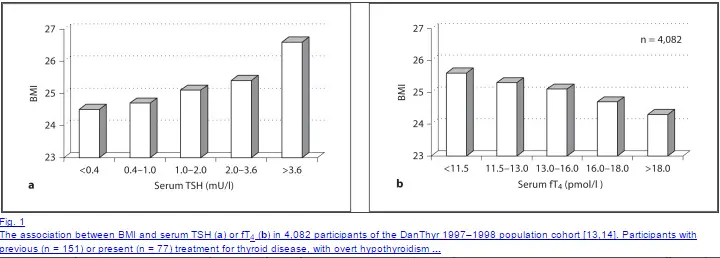
Of course, they would, and the drug companies would be fumbling over themselves trying to patent a new thyroid medication that they could make money from.
You don’t see this happening because thyroid hormone (as a medication) is not a weight loss drug… necessarily.
In most cases, people who are gaining weight with a low TSH usually have 1 of 2 problems (or both):
- T4 to T3 Conversion problems
- Allergies or sensitivities to the inactive ingredients of thyroid hormone (11)
The conversion problem refers to having issues turning T4 into the active thyroid hormone T3.
If your body isn’t good at converting thyroid hormone (from inflammation, infection, medical issues, etc.) then you will have plenty of T4 floating around in your system but very little T3.
The T4 floating around in your system can and will drop your TSH, but it doesn’t mean that it’s necessarily active in your cells.
You can test for this by looking at your free T3/free T4 levels and by evaluating your reverse T3 levels.
If you are having issues with conversion then you can bypass the system by taking medications that contain T3 thyroid hormone-like Cytomel, WP Thyroid, Armour Thyroid, or Nature-throid.
- Bottom line: High levels of reverse T3 can cause your TSH to drop and cause your metabolism to slow resulting in weight gain. To treat this condition you may need T3-containing medication.
Conclusion
Remember that while TSH can be helpful, it isn’t the only (or necessarily the best) way to determine what is happening with your thyroid.
Using a more comprehensive thyroid testing profile in conjunction with your subjective symptoms can help nail down what is actually happening to your body.
When talking about thyroid function it’s important to remember how critical the conversion of T4 to T3 is in regard to how you are feeling.
High levels of reverse T3 with low levels of free T3 may indicate thyroid resistance.
In cases such as these, your TSH becomes less helpful and often is lower than normal.
Now it’s your turn:
Do you have a low TSH?
Are you still experiencing the symptoms of hypothyroidism?
Have you checked your free T3 or Free T4?
What TSH level do you feel “best” at?
Leave your comments or questions below!
